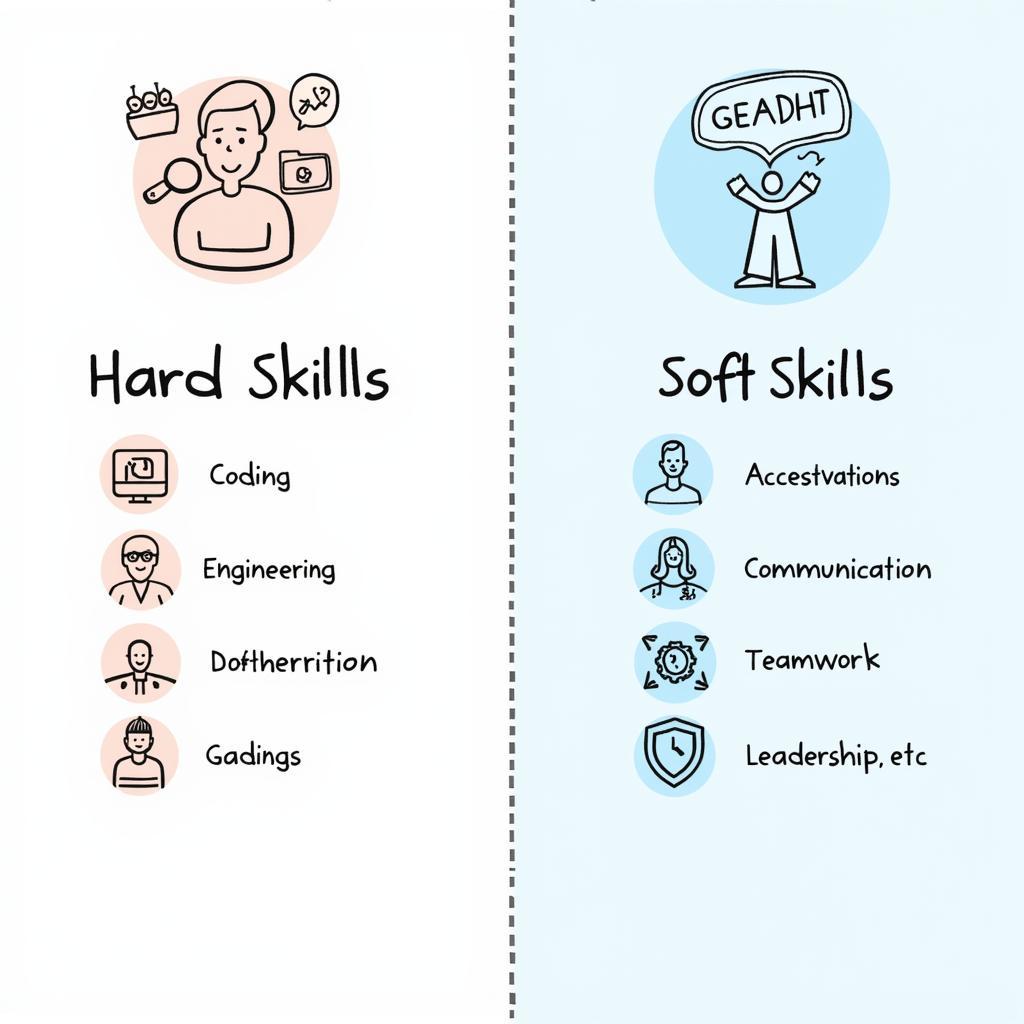Hard skills and soft skills in English are essential for navigating today’s competitive world. Understanding their differences and developing both sets of skills is crucial for achieving personal and professional success. This article will delve into the definitions, importance, and examples of both hard and soft skills, equipping you with the knowledge to enhance your overall skillset.
What are Hard Skills and Soft Skills?
Hard skills are specific, teachable abilities that can be measured and quantified. They are often learned through formal education, training programs, or on-the-job experience. Think of them as the technical knowledge and practical skills needed to perform a particular job. Examples include coding, writing, accounting, or operating machinery. Soft skills, on the other hand, are more interpersonal and relate to how you work and interact with others. These are attributes that enable you to navigate social situations, communicate effectively, and collaborate with colleagues. Think of qualities like communication, teamwork, adaptability, and problem-solving.
 Hard and Soft Skills Comparison
Hard and Soft Skills Comparison
Why are Hard Skills and Soft Skills Important in English?
In today’s globalized world, English has become the lingua franca for business and communication. Possessing both hard and soft skills in English amplifies your value in the international job market. Strong hard skills allow you to effectively perform tasks and deliver results, while strong soft skills enable you to communicate your ideas, collaborate with international teams, and build strong relationships with clients and colleagues.
Having strong [kỹ năng viết bài luận] can significantly improve your academic performance, especially when writing essays and research papers. Furthermore, honing your skills in both areas prepares you for diverse opportunities and allows you to adapt to the ever-changing demands of the professional landscape.
Developing Your Hard and Soft Skills in English
Improving your hard skills requires focused training and practice. Enroll in courses, workshops, or online programs to develop specific skills relevant to your chosen field. For example, if you aim to become a software developer, focus on mastering coding languages and software development methodologies. Similarly, [luyện kỹ năng nghe TOEIC] can enhance your listening comprehension and improve your overall TOEIC score.
Developing soft skills often involves a more introspective approach. Focus on self-awareness, identify areas for improvement, and actively seek opportunities to practice these skills. For instance, participate in group discussions, join clubs or organizations, and engage in activities that require teamwork and communication. You can also explore online resources that focus on developing specific soft skills like [kỹ năng tìm kiếm tài liệu] or [kỹ năng giao tiếp với báo chí].
Examples of Hard Skills and Soft Skills in English
Hard Skills:
- Programming languages (Python, Java, C++)
- Data analysis (Excel, SQL)
- Writing (technical writing, content creation)
- Foreign languages (Spanish, French, German)
- Engineering (mechanical, electrical, civil)
Soft Skills:
- Communication (verbal and written)
- Teamwork and collaboration
- Problem-solving and critical thinking
- Adaptability and flexibility
- Leadership and management
- Time management and organization
- Interpersonal skills and emotional intelligence
Conclusion
Mastering both hard skills and soft skills in English is crucial for success in today’s interconnected world. By understanding their distinct characteristics and investing in their development, you can gain a competitive edge, open doors to new opportunities, and achieve your full potential. So, start honing your skills today and embark on a journey towards a rewarding and fulfilling career.
FAQs
- What is the difference between hard skills and soft skills?
- Why are soft skills important in the workplace?
- How can I improve my English communication skills?
- What are some examples of hard skills in demand?
- How can I demonstrate my soft skills to potential employers?
- What are the benefits of developing both hard and soft skills?
- Are soft skills more important than hard skills?
Common Scenarios
- Job Interview: Demonstrating strong communication and problem-solving skills can impress interviewers.
- Team Project: Effective teamwork and collaboration are essential for successful project completion.
- Client Presentation: Clear and concise communication is crucial for conveying information effectively.
Related Resources
For more information on skill development, check out these articles: [thực tập sinh kỹ năng là gì].
Call to Action
Need help developing your hard and soft skills? Contact us at Phone Number: 0372666666, Email: [email protected], or visit our office at 55 Tô Tiến Thành, Hanoi. Our 24/7 customer support team is ready to assist you.